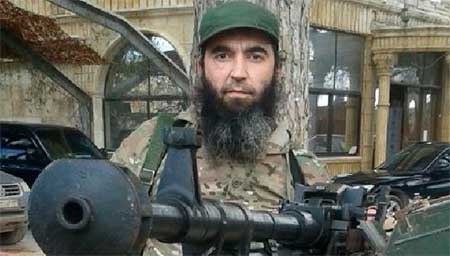
Will Crimean Tatar Jihadists Join Forces With the Caucasus Emirate?
Publication: Eurasia Daily Monitor Volume: 11 Issue: 96
By:

As the Crimean Tatars commemorated the 70th anniversary of their deportation from Crimea on May 18, many wondered what the Tatars’ next moves under the Russian occupation will be. Having already deported ethnic groups en masse—the Karachays in November 1943, the Chechens and Ingush in February 1944 and the Balkars in March 1944—the Soviet leadership sent 200,000 Crimean Tatars into exile in Central Asia in May 1944 (https://www.echo.msk.ru/programs/victory/1293090-echo/).
The Tatars in Crimea have been trying to work out a unified position toward the Russian takeover of their republic, but they are unsure how to reject Russia’s annexation of the peninsula and how to oppose it. Mustafa Cemilev—Crimean Tatar leader and former head of the Mejlis, the unofficial parliament of the Crimean Tatars—addressed the heads of states of Turkey, Azerbaijan and Kazakhstan, saying that the Tatars would never recognize Russia’s occupation of Crimea (https://www.regnum.ru/news/polit/1775403.html).
However, this is the voice of only a small part of the population of the peninsula. At the time of the first occupation of Crimea by Russians at the end of the 18th century, 90 percent of the population of the peninsula (nearly a half million people) were Crimean Tatars, and Russians comprised only 4 percent. However, now, at the beginning of the 21st century, the Crimean Tatars comprise only 10–12 percent, while ethnic Russians make up nearly 60 percent of Crimea’s population (https://www.crimea-on-line.ru/population.faces). Over the two centuries of Russia’s occupation of Crimea, the Russians did everything in their power to reduce the Tatar population. Russian policies forced Crimean Tatars to seek refuge in Turkey, where hundreds of thousands of Crimean Tatars fled, according to estimates (https://www.bigyalta.com.ua/node/33747).
Today, however, no one is in a position to help the Crimean Tatars. This is the view of the leader of the Crimean Tatars’ jamaat in Syria, Emir Abdul-Karim Krymsky, who is the deputy to Emir Salautdin, the Chechen commander of the Jaish al-Muhajireen wal-Ansar armed group. Speaking of his achievements in Syria in an address published online on May 13 (https://www.youtube.com/watch?v=ZrXE5YQ246E#t=106), Emir Abdul-Karim Krymsky also spoke about Crimea. He noted that appealing to European institutions was of no use as they would do nothing for Crimea. Instead, he called on the Crimean Tatars to fight, pointing out that the struggle against Bashar al-Assad showed that it was possible to fight a regime in urban conditions. Thus, the leader of the Crimean Tatar jamaat in Syria openly called for a war against the Russian presence (https://www.youtube.com/watch?v=ZrXE5YQ246E#t=106, starting at 16:38).
The Crimean Tatar emir calls on his compatriots to leave Crimea and join him in Syria if there is no opportunity to put up a fight in Crimea, which probably means that Crimean Tatar militants in Syria are not prepared to help their compatriots in Crimea in the near future and that the Crimean Tatars in Syria consider fighting there to be more important than in Crimea. Another important point in his speech is his recognition of the primacy of the Caucasus Emirate: he states that the Caucasus Emirate is the greatest attainment of Muslims in Russia. This appears to suggest that the only chance for the Crimean Tatars to launch an underground war against Russian is to form an alliance with the Caucasus Emirate.
As of today, Crimean Tatar society is politically diverse. There are people who entirely support the political course of Mustafa Cemilev and want to base their struggle on nationalist political goals implemented through a party. To counter this group, Moscow will establish its own party among the Crimean Tatars, one that will be directed by the Russian security services. President Vladimir Putin has tried to calm the rising tensions surrounding the Crimean Tatar issue. The problem, however, is that Russia and its president equate the Crimean Tatars and the Tatars of Tatarstan. Currently, Moscow is trying to use Tatarstan’s President Rustam Minnikhanov as leverage in Crimea (https://www.newsru.com/russia/01apr2014/tatar.html). Such an approach will produce nothing but resentment among the Crimean Tatars, who consider themselves a separate nation with a long history (https://www.moskva-krym.com/nacia.html).
In other areas it will be interesting to see what happens to the several thousand members of Hizb ut-Tahrir in Crimea (https://www.odnako.org/blogs/hizb-ut-tahrir-kak-vozmozhniy-soyuznik-partii-yanukovicha-v-krimu/). That party is officially designated as a terrorist organization and outlawed in Russia, and its adherents in Crimea are most likely to migrate to mainland Ukraine or Turkey, since they will not be able to exist in their homeland given their persecution by Russia (https://www.vesti.ru/doc.html?id=1525839).
Another possibility is that the adherents of Hizb ut-Tahrir in Crimea may decide to go underground, automatically producing an armed underground movement in Crimea. While members of Hizb ut-Tahrir do not follow the same Islamic teachings as the North Caucasian Salafists, the followers of these teachings in Crimea might join forces because members of Hizb ut-Tahrir have an extensive network across the peninsula but have no expertise in fighting a guerrilla war. The Salafists, on the other hand, have experience fighting against al-Assad’s regime in Syria, but do not have an extensive social base in Crimea.
Thus, the Crimean Tatar Islamists are involved in a process of assessing the new situation, which could further accelerate if Moscow makes increasingly more mistakes in regard to the way it handles the Crimean Tatars. As of today, the developments suggest that Crimean Tatar jihadists will possibly seek a union with the Caucasus Emirate, which will automatically expand the borders of the virtual emirate to the territory of Crimea.




